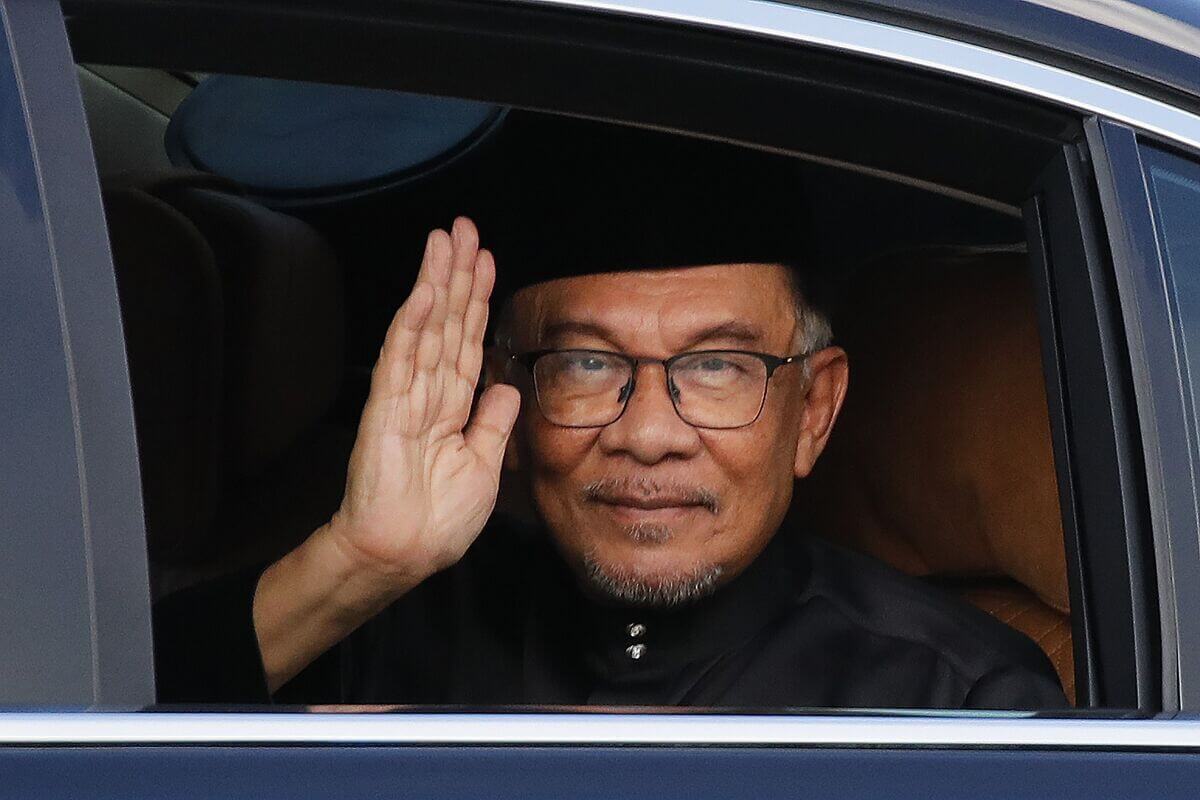Malaysian Prime Minister (PM) Anwar Ibrahim on Monday won a vote of confidence after receiving the support of a majority of the 222-member lower house of parliament, cementing his leadership. The parliament passed the motion by a simple voice vote, as the opposition did not agree to a bloc vote, something that would have reflected the total votes Anwar received.
Anwar’s government secured a two-thirds majority, revealed communications and digital minister Fahmi Fadzil. Noting that the result was “sufficient” for the government to move forward, Fadzil said the “unity government in Malaysia stands strong with solid support, and we will focus on the people’s welfare.”
Lower House speaker Johari Abdul also said Anwar received the support of a “majority” of lawmakers.
Last week, the PM called for a confidence vote to prove he has the support of lawmakers after the opposition, including former PM Muhyiddin Yassin, claimed otherwise. “I am confident of obtaining it. If I can’t, then I will accept the will of the people,” he proclaimed last week.
After decades spending his time in Parliament as the Opposition Leader, Anwar Ibrahim returns as the 10th Prime Minister.
— Firdaus Azil (@FirdausAzil) December 19, 2022
Order of the day:
New Speaker ✅
Vote of confidence ✅
Mini Budget ✅ pic.twitter.com/pPhN6agKar
Thanking the lawmakers who expressed confidence in him, Anwar said the vote proves that he has the majority to continue his agenda. “Now is the time to work and embody the changes that the people crave,” he tweeted.
The vote has removed any doubts that Anwar did not command the support of the Lower House and allows him to carry out his agenda. According to Prof. Sivamurugan Pandian, an expert in Malaysian politics from Universiti Sains Malaysia, the vote “strengthens” Anwar’s mandate to carry out reforms as he is now in charge of a “stable government.”
“Anwar can now put forward his vision for the country,” Sivamurugan said, noting that he would not depend on opposition support for measures that need constitutional amendments.
Anwar, who is also the finance minister, will now be able to take steps to revive the economy and formulate a budget for 2023. He vowed that he would take steps to ensure greater international investments in the economy and fight institutional corruption.
However, the opposition has continued to question Anwar’s legitimacy and vowed to continue challenging him. Opposition leader Hamzah Zainudin said they are ready to replace Anwar’s government “when the times comes.”
I want Anwar Ibrahim to be the 10th Prime Minister for full five years to stop the national decline and to start the long process to make Malaysia great againhttps://t.co/lpe8aSueLY pic.twitter.com/wJgYzfiaFl
— Lim Kit Siang (@limkitsiang) December 16, 2022
He cautioned that this can come at “any time; tomorrow, next week or next election.”
Former PM Muhyiddin’s centre-right Perikatan Nasional coalition, which leads the country’s Malay movement, forms Anwar’s biggest competition, with 74 seats. The alliance includes the Islamist party PAS, which commands 49 seats and is the single largest party in the parliament.
In November, Anwar was sworn in as PM by King Al-Sultan Abdullah to form the government despite no party securing a simple majority in the election. Last week, Anwar’s party signed a cooperation pact with several rival parties for five years, giving him a majority of 148 seats.
Anwar pursued the country’s highest office for several years and has spent close to a decade in jail. He served as deputy PM in the 1990s and was in line to replace former PM Mahathir Mohamed. However, the pair had a falling out over the handling of the Asian financial crisis, which led to him being jailed on corruption and sodomy charges in 1999.
The verdict was overturned in 2004, resulting in his release. He was then tried once again in 2010 and 2012 but was acquitted in 2012. The acquittal was overturned in 2014, following which he was put behind bars for another five years the next year; however, he was given a royal pardon in 2018. Anwar claims the charges were politically motivated and aimed to cut short his career.
Malaysia has been plagued with severe political instability in recent years, witnessing four administration changes since 2018, when Mahathir, who led the country from 1981 to 2003, briefly returned to power in 2018 after breaking UMNO’s stranglehold on power with his Pakatan Harapan coalition.
Muhyiddin resigned after a tumultuous 17 months in office after allied parties withdrew their support, paving the way for Ismail Sabri to enter the office until he dissolved the parliament in October and called for fresh elections.
Anwar’s leadership thus gives the country much-needed respite from near-perpetual political turmoil, as he has the first two-thirds majority since 2008.

